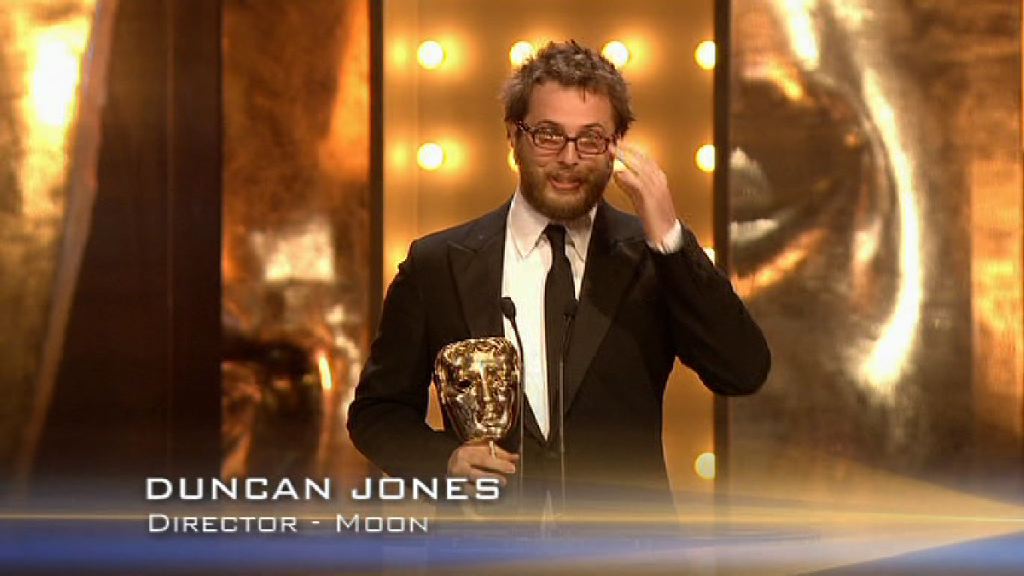
MOON Director Duncan Jones picked up the BAFTA Award for Outstanding Debut By A British Director at the Orange British Academy Film Awards this evening at the Royal Opera House in Covent Garden in London, England.
A very emotional Jones accepted the award from British actor Colin Firth in the evenings opening Award. Close to tears, Duncan revealed that he had not realised how important the award was to him until it actually happened, thanking his producers on MOON (Trudie Styler, Stuart Fenegan & Trevor Beattie) and making special mention of MOON star (The Amazing) Sam Rockwell, who has become a firm friend after Jones wrote the role of Sam Bell specifically for him after conversations about what classic Sci-Fi films meant to them when Jones originally approached Rockwell with a different project entirely.
Nearly overwhelmed by the occasion, Jones revealed how he felt he has finally found his calling in life in making movies, and we here on Man Made Movies are certainly glad he has.
Duncan’s acceptance speech showed the honesty, humility and good grace that is the mark of the man.
We all look forward to many more such occasions, but for now, enjoy a well earned hangover tomorrow Duncan, before heading back to Canada to begin filming ‘Source Code’ with Jake Gyllenhaal.
Post award interview with Edith Bowman, Duncan Jones & Colin Firth >>HERE<< on the BAFTA Youtube Channel.
Duncan Jones accepts his 1st BAFTA AWARD
Edith Bowman Interviews Duncan Jones with Colin Firth






God, i love this and so well-deserved!! It’s only onward and upward from here!!!!! 🙂
Brilliant! so pleased about this – well done Duncan.
Being myself a fan of films, having seen a lot of science fiction, I decided to see the film not knowing what to expect since I knew it was a low budget one. It’s brilliant, I loved it! Even got emotional while watching. Well deserved the award, congratulations to Duncan Jones !!!
Looking forward to the next film Duncan does.
That was such a sweet acceptance speech. Well done Mr Jones and all who sail in her (what?) – may your next film be swiftly forthcoming! (although I can always watch Moon again!)
MotleyHippie
Very excited for you! Well done. I’m a Sam Rockwell fan, as well!!!
Looking forward to Source Code, with Jake Gyllenhaal and Jeffery Wright.
Well deserved!!!!
I just watched this vid of Duncan’s acceptance. He is so sweet. What a lovely guy. BTW: I just tweeted about a reference to Moon int the latest London Review of Books (35 Feb issue) If he hasn’t already seen it, Duncan should read it. Sort of shows how his work has entered into the popular mythology of earth’s moon. Pretty cool.
Congrats Duncan. Such well-deserved recognition. I took my 19 year-old son to see Moon when it first came out. And he really loved it. So did I.
Thanks Davanna, I took my mother second time I went to see it last year, she loved it too 🙂
Full version of the O’Hagan article does not seem to be online? Could only find this:
http://www.lrb.co.uk/v32/n04/andrew-ohagan/goodbye-moon More in the publication itself?
unklerupert,You are welcome
I registered on the site since I have a print subscription. Here is full article:
Goodbye Moon
Andrew O’Hagan
BUYThe Book of the Moon by Rick Stroud
Doubleday, 368 pp, £16.99, May 2009, ISBN 978 0 385 61386 6
BUYRocket Men: The Epic Story of the First Men on the Moon by Craig Nelson
John Murray, 404 pp, £18.99, June 2009, ISBN 978 0 7195 6948 7
BUYMagnificent Desolation: The Long Journey Home from the Moon by Buzz Aldrin, with Ken Abraham
Bloomsbury, 336 pp, £16.99, July 2009, ISBN 978 1 4088 0402 5
Since the beginning of time – or of poetry – people have imagined the Moon is watching them. When I was a child I thought the Moon was a chum. Every boy had a torch and at night I shone mine from the bedroom window, refusing to be upstaged by the big torch in the sky. I remember asking my mother if the Moon could come on holiday with us, and she laughed, exactly the same laugh as my father gave out when I said I wanted to be a film star. I think the great joke lay in the idea that we might go on holiday. In any event, we did eventually go on holiday – to Butlin’s holiday camp in Skegness – and the Moon came along very loyally. I was getting into poetry and the Moon was becoming a thing to conjure with for the solo flier. At Skegness, I sat on the edge of a fountain with a neon sign behind me which said: ‘Our True Intent Is All for Your Delight.’ The Moon was bright and impervious but I remember coming to a decision about the Moon and me. I’m going to be around for a while, I thought, so we should probably try to get along.
I only wish Rick Stroud’s book had been available then. It is the most surprising, capacious and elegant book about the Moon you could imagine. First, we have the familiar facts. The Moon is 240,000 miles from the Earth. The surface temperature is 134ºC. Age of the oldest rock collected from the Moon: over four billion years. Then we have the first in a serious of perfect Stroudisms: driving time (to the Moon) by car at 70 mph: 135 days. Walking time at three miles per hour: 8.6 years. The water on the side of the Earth which faces the Moon bulges towards it (the water on the other side bulges away). Things change very slowly on the Moon: ‘Neil Armstrong’s first footprint will be visible in thousands of years.’ You learn about craters, basins and lunar seas. Far from being a stable, distant globe of tranquillity, the Moon has been subject to billions of years of mega-violence, eruption and molten existence, its surface not a spotless face but a mass of scars, where meteors of all kinds, some the size of Manhattan, are known once to have impacted.
Man has made a fuss of the Moon because it is much more constant than we are, much more visible than our ancestors. The megaliths near Abu Simbel, the stones aligned to mark the moonrise and moonset at Stonehenge, the 5000-year-old stone circle at Callanish on the Isle of Lewis: they all appear to describe the extent of our capacity for wonder, the full midsummer Moon at the Callanish stones in certain years appearing ‘to skim the horizon in a ghostly and prophetic way’. Stroud is a connoisseur of Moon spells and werewolves, a student of Ptolemy and Democritus, and through him you come to see how the life of the Moon accords with our deepest humours. For my generation, born as Apollo 11 cleared the launch pad, the attempt to reach the Moon seemed like the definition of human adventure.
The closing down of the Moon programme therefore seems baffling to me. In frontier literature, conquering a bit of the unknown always heralds a massive alteration in the conditions of living. The wagons travelled west and a new period was born. Not so with the Moon: there our exploration served only itself, leaving the Moon much as we found it, empty and desolate and far away. It was the greatest feat of exploration in human history, but we are left with a sense of stasis and of excommunication. It was imagined that everything would change once we had looked back at the Earth from another place, but, to everyone’s surprise (especially Nasa’s), we retired into our fetishistic world of goods and wars. No real routines were set in place by the lunar achievement: when the space agency announced a plan to head once again for the Moon, they said it would take until 2020 (longer than the original programme, which had had to do much of the science from scratch).
But, looking back, we can now see that the space programme in the 1950s, 1960s and early 1970s was the greatest instrument of geopolitical change apart from nuclear weapons, and it was always related to nuclear weapons. We could say that it was not the age of ideology, but the age of rockets. It was a period when wonder gave way to fear in a way that emboldened ideology. The beautiful machines of the space programmes were never really instruments of change so much as tools of aggression, no more progressive than the gun batteries on the Somme. Last year’s anniversary of the Moon landing – the 40th – did not take stock of that: of the way the Cold War and the space-weapons programme conditioned our lives, bankrupted nations, fouled hopes of true co-operation, and left us more or less where we started, much like the ancient Egyptians, looking up at the sky and wondering how the Earth would survive our curses.
But where the ancients had gods, we have public relations. In Rocket Men: The Epic Story of the First Men on the Moon, Craig Nelson tells the tale in a way that seizes the spirit of the age:
A central reason for the creation of the federal space agency was to prove to both the citizens of the United States and the world at large that the American way of life was superior to totalitarian Communism. Public relations, on a massive and global scale, was at the very heart of the enterprise. Nasa’s overseas PR, in fact, would reach a hundredfold success in the aftermath of Apollo 11, creating a worldwide surge of admiration for the United States, a dazzling peak of global prestige that has never been equalled.
For most Nasa fliers, however, working with the media was simultaneously a glorious ego boost and excruciatingly oppressive … Astronauts would become famous through the press, and famous to the press for their loathing of the press, a sentiment shared by the great majority of the agency’s other employees. Many Nasa workers were immersed in principles of celestial mechanics, in work so astronomically complicated that explaining it to a layman was more trouble than it was worth. Abetting them was a military infusion of pilots and contractors, men who believed with all their hearts that the less said, the better (an attitude epitomised by Apollo 11’s commander).
Apollo 11’s commander, Neil Armstrong, took saying less to what we may as well call cosmic extremes. He went silent, became absent, allegedly working but never seen, the J.D. Salinger of the US space programme.
The race for the Moon was fuelled by a terrifying combustion of scientific know-how and political paranoia. But the rocket engineers’ sense of how to articulate awe, how to inhabit teatime-news psychology, how to manipulate their way around geopolitical fears and ambitions, was very small indeed, which may explain why so many of them disappeared or cracked up after the public frenzy which attended their going into space. One can never forget that the Apollo programme came hot on the heels of duck-and-cover, getting underway just before the Cuban Missile Crisis. The American fear of death raining down from the open skies gave these men a purpose as saviours, as the people who could show that American rockets could go further than anybody else’s. (Eleven of the 12 men who walked on the Moon had been Boy Scouts.) Kennedy’s ambition to land a man on the Moon was sold as a raid on the new frontiers, but the spectre of Soviet domination of the heavens stalked the American mind, and the Age of Dread drew great sustenance from competing lunar missions. ‘The Apollo programme was a non-military one,’ the aerospace technologist Paul Lowman tells us,
but it nevertheless involved developments in many technological areas that also are crucial to national defence: rocket propulsion, inertial guidance, computer utilisation, electronics, radar, remote sensing, advanced materials, and others. The success of Apollo thus provided … a demonstration of the inherent superiority of American technology. It seems safe to suggest that this demonstration is a real contribution to prevention of a global thermonuclear war; no potential aggressor could plan a surprise attack on the United States without taking into account the military strength implied by it.
And Craig Nelson concludes: ‘Perhaps the most important reason for going to the Moon, then, is that the space race kept the Cold War cold.’
So that’s what the Moon was: not some opalescent disc awaiting man’s greatest adventure, not science’s ultimate destination, but the objective correlative of ideological victory. Armstrong’s ‘small step’ would vanquish for ever the memory of Sputnik. Like Vietnam or the Fischer-Spassky chess match, the Moonshot was a proxy for nuclear war. Behind the flag-waving at Cape Canaveral and beyond the ticker-tape parade down the Canyon of Heroes, the delighted faces of the American public expressed mainly their gratitude that every effort was being made to stop the world from blowing itself to smithereens. But it took Ronald Reagan to fulfil Kennedy’s prophecy, and make rockets into a final sales pitch for global capitalism.
We know that the spoils of German rocket technology were unequally divided after the war: a handsome young aristocrat, Wernher von Braun, a major in the SS and the inventor of the V2 rocket, made it to the US with as many papers, instruments and scientists (118) as he could manage. (Von Braun had worked from Mittelwerk, a production factory in the Harz mountains, 70 miles from Leipzig, an installation which had a concentration camp next to it, from which slaves dug tunnels into the mountains.) Stalin was furious at losing the cream of Nazi rocket technology to the Americans and he was right to be: they formed the foundation of the postwar American space programme. Von Braun wrote popularising pieces about space for Collier’s magazine, and was hired as a consultant to Disneyland’s Tomorrowland in its television incarnation. The success of the show, Nelson writes, ‘established von Braun as the national symbol of rocket science. He looked like a movie star, said things like, “We can lick gravity, but sometimes the paperwork is overwhelming,” and with the help of Collier’s and Disneyland, became the space and missile race’s first American celebrity.’ Just about anything could be forgiven when it served the interests of American advancement. From annihilation to annihilation, and fully present in the arena of public thrills, von Braun embodied a particular kind of Cold War moral journey. ‘In the end,’ Freeman Dyson wrote, ‘the amnesty given to him by the United States did far more than a strict accounting of his misdeeds could have done to redeem his soul and to fulfil his destiny.’
Destiny. A useful word in the age of the Moonshot. It was felt that the lunar landings fulfilled a fundamental need to know the cosmos and inhabit it. Yet since then our instincts have taken a turn for the worse: we have become more inward as a species, retreating behind our telescopes. The costs of space travel are, as they say, astronomical, but they compare very favourably with the costs squandered every year on pursuing our holy wars. In today’s money, the entire cost of the Apollo programme was spent in 540 days of the war in Iraq. Perhaps it was an unexpected result of our lunar wanderings: in the end they marked the limits of the old capacity for wonder, showing humanity that it was, at base, rather provincial. The Moon we stare up at is in fact more naturally a thing of myth and childhood than of adult ambition: it shows us the face of a character we possessed only for two decades, when we feared for our survival.
Yet we shouldn’t forget what the rockets did for us and are doing for us now as I write. ‘Between 1998 and 2007,’ Nelson tells us, ‘421 telephone, internet, radio, TV, reconnaissance, GPS and defence satellites were launched. Today, there are so many artificial moons in orbit that they, combined with four million pounds of orbiting refuse, form a veritable exoskeleton enrobing the earth.’ We were always good at trash, and always better at imagining ways to split infinity, ‘to boldly go where no man has gone before’, than we are at actually doing it. The Moon is back where it used to be, a thing of the imagination. Of all the books, and all the poems,[*] perhaps the strongest on this point, this natural downscaling of cosmic awe to the level of everyday worries, is to be found in Buzz Aldrin’s memoir, Magnificent Desolation.
Aldrin was different from the other astronauts. He was a data-wonk, as they all are, and a technical boffin, but he was much larkier than the others and given to regular mini-boosts of bad behaviour. By his own account, he was never that bothered about who was the first man to step on the Moon. But by every other account he was gasping to be first, wriggling for the glory he knew would come from it, until Neil Armstrong, as commander, took the decision to step out first. Buzz alleges it was just that Neil was nearer the opening hatch, but no: he wanted it, and he failed to get it, and his life since then has been something of a struggle to cope with the almost comically human business of being ‘the second man on the Moon’. Buzz is a nice man but naive as all get-out; perfect, in a way, for the picture-postcard commentary he has always been asked to provide. There was no Robert Frost or Allen Ginsberg in space, but we have Buzz: ‘Our blue and brown habitat of humanity appeared like a jewel of life in the midst of the surrounding blackness. From space there were no observable borders between nations, no observable reasons for the wars we were leaving behind.’
Leaving behind? Come, come Buzz. He was helping to pilot a Cold War capsule, a war machine as light as the Trojan Horse was heavy. Before helping to plant the American flag on that little inch of pulverised rock, Aldrin took communion in the landing module, and prayed that people would keep the larger thing in their minds, ‘the human need to explore whatever is above us, below us, or out there’. Yet Aldrin had trouble keeping this in mind himself, as if the smaller business of being Buzz Aldrin could only struggle to live up to the magnitude of what he had once felt as a man on the Moon. Aldrin was required to knuckle under to the demands of PR: he travelled the world representing Nasa, essentially fronting the effort to gain more federal funding, and in the process the space dust was rubbed off his boots. Becoming famous for doing something very symbolic but very complicated must be odd when all you can talk about is the symbolic. The result, for Aldrin, was a growing addiction to that most earthly of panaceas: drink. He was depressed and inert for the first decade of his fame, leaving a trail of desolation in his life that could only rival the lunar wastes. The Moon seemed to mock him and his story is all too like a million twinkling star memoirs, filled with abuses, recoveries, affirmations, and the eventual love of a good woman.
In some strange way, the Moonwalkers often came to feel they’d left some essential part of themselves behind on the lunar surface. They wanted to get back there; they wanted to be that person again. People are used to feeling something of that about the landscapes of their childhood, but to feel it about a crucial moment in one’s thirties – and to feel it all one’s life – must be one of the newer kinds of alienation. ‘Planet Earth is blue and there’s nothing I can do,’ David Bowie sang in ‘Space Oddity’, the song that captured something of that strangeness. (It was featured in the BBC’s live coverage of the lunar landing.) Bowie, in his spaceman/ androgyne mode, conveyed the idea that space travel could change a man for ever. Forty years on, Bowie’s son, Duncan Jones, has been tinkering with the same thought. Duncan opted out of his father’s strangeness some time ago (mainly by changing his given name, Zowie, to Duncan) but we needn’t travel far in our minds to see how the obsessions of the father are sometimes reborn in the son.
Moon is Jones’s first feature film, and it is a delicate, persuasive piece of storytelling about a man facing the possibility of his own duplication as he works to gather isotopes up there.[†] The Moon is rich in a natural substance called Helium-3, a shuttle-load of which, according to Rick Stroud, could meet America’s energy needs for a year. In the film, Sam Rockwell plays Sam Bell, an astronaut who is seconded to the Moon to dig for Helium-3, and we see him slowly unravelling. The sense is strong in the film that this place has gone from being a zone of discovery – a site where the national flag was planted with all ceremony – to being a quarry. It seems reasonable that Sam Bell will meet his double there, another version of himself who will bring him to the eerie conclusion that home is lost. The Moon, too, was part of the American dream, but also of other dreams, and this film’s small brilliance lies in its understanding of alienation-hangover, the feeling we were left with once all the ticker tape had gone.
Anyone who believed that Obama’s election would mean a resurgence of Kennedy-style ambitions in space will have been disappointed. It is a graveyard up there now, the tomb of another era’s ideological struggles. The new president probably wouldn’t mind some Helium-3 but he does not seek to make his mark in space. He launched his 2011 Budget by cancelling Nasa’s $81 billion Constellation programme, the plan to return Americans to the Moon by 2020. Bill Nelson, a former astronaut and a Democratic senator for Florida, has been trying to stir up some of that old Cold War magic by arguing that the Obama cuts will put an end to five decades of American superiority in space, ceding power in the cosmos to the Chinese and the Russians. But Obama’s people see all that as yesterday-speak, not relevant to the way things are likely to be in the new tomorrowland. The age of the American state monopoly on lunar exploration is effectively over. Manned spaced flight will increasingly become a matter for commercial business, and Obama privately feels this is the way of the future. ‘Give space a chance,’ say the cosmic nerds of the worldwide web, and goodbye to the Moon.
[*] A nice selection of them can be found in To the Moon: An Anthology of Lunar Poetry edited by Carol Ann Duffy (Picador, 187 pp., £14.99, October 2009, 978 0 330 46131 3).
[†] Moon, directed by Duncan Jones (£19.99, November 2009).